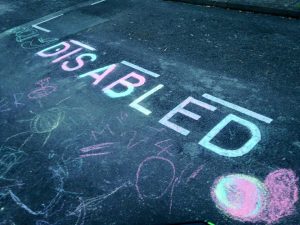Professor David Abbott, from the Norah Fry Centre for Disability Studies, looks at collaboration and power sharing in coproduced research.
It’s #CoProWeek if you’ll excuse the twitter short-hand. And with a whiff of, ‘This is what I did in my holiday’ news, I am not long back from a summer school about co-production at the rather glorious and gloriously named, University of the Highlands and Islands.
One of the things I liked about the course was that we were comprised of researchers, activists, heads of charities, community agitators and leaders, and policy and engagement types. We shared a commitment to making things change and making things better in our respective communities. I think some of us went searching for the perfect way to do coproduction and of course in that respect we were usefully disappointed. Two main learning points for me, about which more below, were: 1. Coproduction behoves us to rethink who is ‘we’ and who is ‘them’ and ‘they’? 2. In the overall endeavour of research, who has a say, who always has a say and who rarely or never has a say?
It seems to me that lots of folks are in search of ‘true’ co-production, some holy grail of perfect collaboration and power sharing. We are awash with toolkits, guidance, good practice, courses and webinars about coproduction. It’s an industry in and of itself. I wonder if there is more of this than actual coproduction.
In my field at the intersection of social policy and disability studies, there is a long history of problematising the role and historical dominance of non-disabled people doing research on disabled people. The movement towards more inclusive research with disabled children, youth, and adults, including those with learning disabilities, is now however fairly well established.
In my first research job with a disability focus, our young disabled people’s reference group held a fairly long, no-holds barred discussion about whether or not I should be in the room as a non-disabled person. It was very uncomfortable for me but they were rightly asserting their power and asking a legitimate question. So, coproduction for me sometimes has a feeling of ‘emperor’s new clothes’ but also something co-opted for better and sometimes worse to actually mask power differentials. I can still really only whisper in lower case about being part of a so-called coproduction team evaluating a so-called coproduced government policy programme “with” (lol) disabled people. The volume on coproduction was high but the reality was draconian and grim.
What I can say, from my own experience of being part of a project team made up of user-led organisations, disabled people’s organisations and university researchers, are three things:
- It felt like coproduction because it was hard and mostly uncensored. We had similar goals but I think the wider team sometimes felt I was a bit slavish to the research proposal and agreement with the funder. Others sometimes wanted to ‘get on with it’ or change things. I often did too but felt a bit uptight with the burden and privilege (?) of being the budget holder (see below).
- It worked well as coproduction because we played to our agreed strengths and interests.
- When we asked participants why they had decided to take part in research interviews, several said it was because of the team. Some said they would have put the paperwork in the bin straight away if it had just come from “the University”. The nature of the team reassured people about the underlying values of the research and that there was some presumption of trust and safety.
Money matters and I mentioned above that I had been the budget holder in our work together even though in fact the collaboration was well established and the need for research established before I was ever invited in as a researcher. (I liked this. To me it turned on its head the usual idea that coproduced research is about the researcher inviting the non-academics, the non-researchers into the tent. Plus, note the ‘non’ rather than what people actually are – experts in all kinds of domains.) But the reality is that many funders require the budget holder or principal investigator to be based in a University or the NHS or some other statutory service. This doesn’t rule out coproduced collaborations but the power is already and instantly a bit unequal.
This is why the Disability Research on Independent Living & Learning (DRILL) programme was so neat as the world’s first major research programme led by disabled people. Not to my credit, but I can recall feeling irked that such a big funding opportunity excluded me from applying missing, initially, the point that this was entirely right and massively exciting and important. My initial annoyance presumably mirrored by groups routinely excluded from or hampered by the set-up of research funding streams.
If I can end by directing you to elsewhere it’d be to this brilliant podcast which discusses what to my mind is a wonderful, authentic piece of coproduced research with young disabled women living shorter lives but exerting the value, joy and expertise that their lives engender. “Coproduction is not about having all the answers, but about learning together,” say the researchteam. Amen sisters.
David Abbott is a Professor of Social Policy in the School for Policy Studies at the University of Bristol and an Associate Director of NIHR School for Social Care Research. He tweets things about research, cake and the countryside at @davidabbottbris


